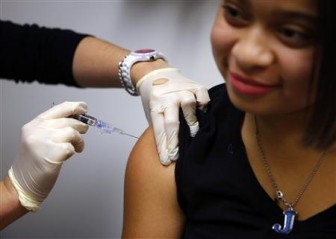(Reuters) – Influenza has officially reached epidemic proportions in the United States, with 7.3 percent of deaths last week caused by pneumonia and the flu, the U.S. Centers for Disease Control and Prevention said today.
The early start and fast spread of flu this season – especially after 2011-2012’s very mild outbreak – has overwhelmed doctors’ offices and hospitals, forcing some patients to wait through the night to be seen in emergency departments.
Nine of the 10 U.S. regions had “elevated” flu activity last week, confirming that seasonal flu has spread across the country and reached high levels several weeks before the usual late January or February, CDC reported.

Credit: Reuters/Brian Snyder
Only one region – the Southwest and California – had “normal” flu activity last week.
Tens of thousands of Americans die every year from flu, even in non-epidemic years. The threshold for an epidemic is that it causes more than 7.2 percent of deaths, but as yet there is no definitive count of the total caused by flu this year.
In Boston, flu cases are 10 times higher than they were last year, causing Mayor Thomas Menino to declare a public health emergency on Wednesday.
In Illinois, 24 hospitals struggling to cope with the flood of flu cases had to turn away people arriving in the emergency department, while in Pennsylvania, the Lehigh Valley Hospital outside Allentown has set up a tent for people who arrive with less-severe flu.
A total of 20 children have now died from this season’s flu, up two from the previous week, the CDC said. That compares to 34 during the full 2011-2012 flu season and 282 during the severe 2009-2010 season.
The outbreak has led to attempts at prevention that go beyond the standard advice of getting vaccinated, avoiding contact with sick people and frequently washing hands with soap.
In Boston, the Catholic Archdiocese has told priests they could suspend the offering of communion wine using a shared chalice and bow rather than shake hands while exchanging the Sign of Peace, a Christian greeting.
Auxiliary Bishop Robert P. Deeley urged priests to use hand sanitizer before and after communion and to avoid touching congregants’ tongues or hands. He said parishioners who were ill “should remain at home and return to church when they are well.”




